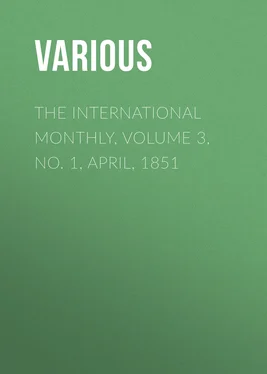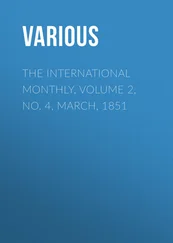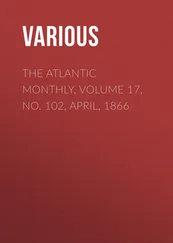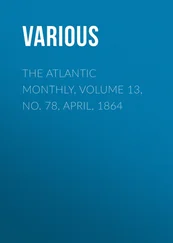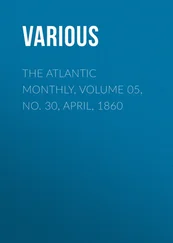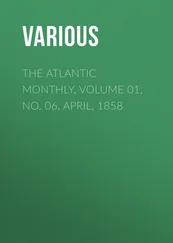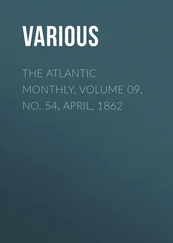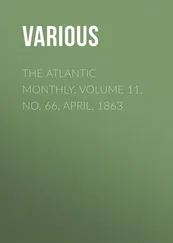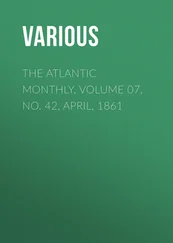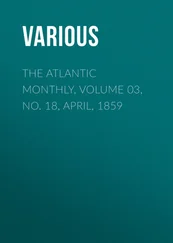Various - The International Monthly, Volume 3, No. 1, April, 1851
Здесь есть возможность читать онлайн «Various - The International Monthly, Volume 3, No. 1, April, 1851» — ознакомительный отрывок электронной книги совершенно бесплатно, а после прочтения отрывка купить полную версию. В некоторых случаях можно слушать аудио, скачать через торрент в формате fb2 и присутствует краткое содержание. Жанр: foreign_antique, periodic, foreign_edu, на английском языке. Описание произведения, (предисловие) а так же отзывы посетителей доступны на портале библиотеки ЛибКат.
- Название:The International Monthly, Volume 3, No. 1, April, 1851
- Автор:
- Жанр:
- Год:неизвестен
- ISBN:нет данных
- Рейтинг книги:3 / 5. Голосов: 1
-
Избранное:Добавить в избранное
- Отзывы:
-
Ваша оценка:
- 60
- 1
- 2
- 3
- 4
- 5
The International Monthly, Volume 3, No. 1, April, 1851: краткое содержание, описание и аннотация
Предлагаем к чтению аннотацию, описание, краткое содержание или предисловие (зависит от того, что написал сам автор книги «The International Monthly, Volume 3, No. 1, April, 1851»). Если вы не нашли необходимую информацию о книге — напишите в комментариях, мы постараемся отыскать её.
The International Monthly, Volume 3, No. 1, April, 1851 — читать онлайн ознакомительный отрывок
Ниже представлен текст книги, разбитый по страницам. Система сохранения места последней прочитанной страницы, позволяет с удобством читать онлайн бесплатно книгу «The International Monthly, Volume 3, No. 1, April, 1851», без необходимости каждый раз заново искать на чём Вы остановились. Поставьте закладку, и сможете в любой момент перейти на страницу, на которой закончили чтение.
Интервал:
Закладка:
WHITEHALL.
The scene in St. James's Park to which Evelyn refers, was an index to the age 5.
Blessed as we are in the knowledge that nowhere in England are the domestic virtues better cultivated or more truly flourishing than in our own pure and high-souled court, we are almost inclined to treat as a mythological fable, the history of Whitehall during the reign of Charles the Second. No one trait of the father's better nature redeems that of the son. His life was indeed
"a sad epicure's dream,"
and worse. He was not worthy even of the earnest devotion which the poor orange-girl, of all his favorites, alone manifested to the last.
Poor Nell! the sympathy which every right-thinking woman feels it a Christian duty to give to her and her class, far from extenuating vice, is only a call upon the virtuous to be more virtuous, and to the pure to be more pure. No one would plunge into crime, merely for the sake of being redeemed therefrom; no one take the sin, who looked first at the shame, hideous and enduring as it must be—however overshadowed by the broad wings of mercy; the burn of the brand can never be effaced, however skilfully healed. And when the wit, the loveliness, the generosity, the fidelity of "Madame Ellen," when the memory of the well-spent evening of her checkered life, and the allowance we make for the early impressions of a young creature, called upon to sing her first songs in a tavern, and sell oranges in the depraved and depraving saloon of "the King's House;"—when all these aids are exerted to excite our sympathy, we only accord the sentiment of pity to "poor Nell Gwynne!"
While looking at the house said to have been inhabited by this " femme d'esprit par la grace de Dieu !" we vowed a pilgrimage to Sandford Manor House, at Sandy End, Fulham,—to the dwelling where there is no doubt she spent many summer months. Near as it is to our own, we were doubtful of the way, and determined to inquire of our opposite neighbor, who keeps the old Brompton tollbar.
"Sandford Manor House," repeated he, "I never heard tell of such a place in these parts. Whereabouts is it?"
"Exactly what we want to know. It is a very old dilapidated house, by the side of a little stream that runs into the Thames somewhere by Old Chelsea. I think you must have heard of it. It was once inhabited by the famous Nell Gwynne." I might almost as well have talked Hebrew to our neighbor, who seemed born to lay in wait for market-carts, and pounce upon them for toll.
SANDFORD MANOR HOUSE.
"Old house! Nell Gwynne!" he again repeated, and something like an expression of life and interest moved his features while he added—"It's the Nell Gwynne public-house you're after, I'm thinking; that was in Chelsea; but whether it's there now or not, is more than I can tell."
"No, no," we answered, perhaps, sharply, "it is the house she lived in we want to see—Sandford Manor House."
"Perhaps it's the madhouse," he suggested. We walked on. "Please," said a little rosy-faced boy, "if you want to find out any thing about old houses, Hill, the rat-catcher, knows them all, as he hunts up the rats and sparrows about; and you have only to go down Thistle Grove, into the Fulham road—straight on. His is a low house, ma'am—his name in the window—you can't pass it, for the birds and white mice."
And is there no one left, we thought, to tell where the witty, light-hearted, true-hearted Nelly lived—she who was the friend of Dryden and Lee, the favorite of Lord Buckhurst, the rival of the Duchess of Cleveland, the protector of the soldiers of England—the one unselfish friend of the selfish Charles? Is there no one in a district that once echoed with the praise of her charities—no one to tell where she resided, but Hill, the old rat-catcher? We proceeded through the prettily-built, but gangrened-looking, cottages located in Thistle Grove, once called Brompton Heath, (or Marsh, we forget which,) until the sounds of traffic reminded us that we were in the Fulham road. Presently the sharp voice of a starling, just above us, attracted our attention.
"Poor Tom!" said the bird—"Tom!—poor Tom!"
The old rat-catcher invited us to enter. He is a man of powerful frame, with a massive head, fringed round with an abundance of gray hair, with deep well-set eyes, and a quiet smile. Two sharp, bitter-looking, wiry-haired terriers began smelling, casting their sly eyes upwards, to see if we feared them or were friendly to their advances, and, after a moment or two, seemed sufficiently satisfied with the scrutiny to warrant their wagging their short stumpy tails in rude welcome. The room was hung round with cages of the songbirds of England—some content with their captivity, others restless, and passing to and fro in front of the wires, eager for escape. Strong inclosures, containing both rats and ferrets, were ranged along the sides of the small room; the latter, long, yellow, pink-eyed, and pink-nosed creatures, lithe as a willow wand, courting notice; while the rats, on the contrary, moved their whiskers in defiance, and, with bright, black, determined eyes, sat lumped up in the distant corners of their dens, ready 'to die game,' if die they must. Gay-colored finches, the gold and the green, graced the window in little brown bob cages; while mice of all colors, from the burnt sienna-colored dormouse, who was more than half asleep within the skin of an apple which it had scooped out, to the matronly white mouse, who was sitting composedly amid a progeny of thirteen young ones, attracted groups of little gazers, every now and then dispersed by the larger terrier, who ran out amongst them, snarling and threatening, but doing them no harm. "Come in, old chap; that will do, old fellow," said his master, adding, "I would not keep a dog that would hurt any thing but a varmint ."
"Oh, oh! Nell's old house," he replied to our inquiries; "Nell Gwynne's house at Sandy End, where runs the little river they deepened into a canal—the stream I mean that divides Chelsea from Fulham—Sandford Manor House! Ay, that I do, and I'd match it against any house in the county for rats!—terrible place—I lost two ferrets there, this time two years, and one of them was found t'other side of the canal; it must have been a pleasant place in those days, when the king was making his private road through the Chelsea fields, and the stream was as clear as a thrush's eye, and birds of all sorts were so tamed by Madame Ellen, that they'd come when she'd call them. Ah, a pretty woman might catch a king, but it's only a kind one that could tame the wild birds of the air; I know that; I'll show you the way with pleasure." "Poor Tom," sung out the starling. "Your bird is calling you," we observed, after he had told his wife not to let the jay pick "the splints" off his broken leg, and we were leaving the door. "It's not me he's calling," answered the old man, with a heavy sigh. "Now that's a bit of nature, ma'am. A bird, I'm thinking, remembers longer than a Christian does. Poor Tom's wife is married again, but the starling still calls for its master. It's hard to say, what they do or do not know; the bird often wrings my heart; but for all that, I could not part with him." At any other time we would have asked him the reason, but just then we were thinking more of Nell Gwynne than of our guide. We walked on, until we came to the "World's End." "It is nothing but a common public-house now," observed our companion, who had not spoken again, except to his dog: "but I remember when it was more than that; and, moreover, in Nell's time, it was a place of great resort for noblemen and fine ladies—a royal tea-garden, they say—filled with the best of good company; they liked the country and the open air in those days." We continued silent, until at last our guide called "Stop!" so suddenly, as to make us start. "Do you see that bank just under the arch of the bridge we stand on? The hardest day's work I ever had was digging an old rat out of that bank. This is Sandy End; and that house opposite is Sandford Manor House 6."
Читать дальшеИнтервал:
Закладка:
Похожие книги на «The International Monthly, Volume 3, No. 1, April, 1851»
Представляем Вашему вниманию похожие книги на «The International Monthly, Volume 3, No. 1, April, 1851» списком для выбора. Мы отобрали схожую по названию и смыслу литературу в надежде предоставить читателям больше вариантов отыскать новые, интересные, ещё непрочитанные произведения.
Обсуждение, отзывы о книге «The International Monthly, Volume 3, No. 1, April, 1851» и просто собственные мнения читателей. Оставьте ваши комментарии, напишите, что Вы думаете о произведении, его смысле или главных героях. Укажите что конкретно понравилось, а что нет, и почему Вы так считаете.
